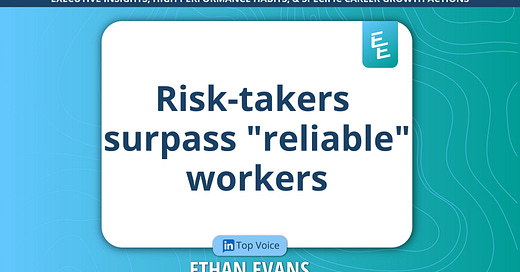Risk-takers surpass "reliable" workers
What sets you apart: Taking risks, high performance, and building relationships
Welcome to this week’s free article of Level Up: Your source for executive insights, high performance habits, and specific career growth actions.
We are thrilled to share that Maven selected us as one of their top “Fast Track” courses and instructors! As a result, Maven is offering 25% off our popular course Stuck at Senior Manager - How to Break Through to Executive (1,000+ alumni, rated 4.7/5) AND our new course co-taught with David Markley (VP of Technology, fresh off shipping support for the 2024 Paris Olympics) Lead Large-Scale Tech & Excel as a Technology Executive.
Use code FAST25 at checkout.
(this will be the biggest discount offered for either course—thank you Maven!)
Success boils down to high performance, building relationships, and risk-taking. Hard work alone is not sufficient.
As a VP, I constantly see risk-takers surpass “reliable” workers.
Here’s why:
Everyone is educated, and everyone works hard.
As an executive, I can always find another person with a great education, good skills, and the drive to work long hours. Those things alone do not set you apart!
What sets you apart is the mix I mention above: Taking risks, high performance, and building relationships. This combination isn't linear, but the pieces lead into one another.
Here is how it works:
1) You take risks because:
→ Risks create opportunities for high performance
→ Risks carry the potential for remarkable results
→ Risks get noticed
2) High performance fits in like this:
→ High performance is what you do to earn the right to take a risk
→ High performance is what you do to try to make that big bet pay off
→ High performance is how you re-earn your credibility if something goes wrong
3) Along the way, you build relationships because:
→ Leaders take chances on those they trust
→ Leaders give second chances to those they know
→ Leaders promote those who deliver remarkable results
You can also think of it like this:
Good, effective, hard work is the base of your pyramid → Relationships are built on top of competence → Strong relationships support disruptive innovation.
Merely being "reliable" is like the career version of the "friend zone”.
You'll be respected, valued, and kept around, but you will never stand out enough to be chosen.
Build the base to take a big risk and then TAKE IT.
That’s how you will move up.
See section 3 in this post on how you can learn to invent.
Level Up Slack Community (800+ members): What’s Happening
Ethan’s next live executive coaching event is with a Director of Engineering, this community member won the free coaching session from a sea of terrific applications. The next winner to be announced.
Hiring:
Amazon SDE II
Microsoft Software Engineering Manager
Microsoft Senior Silicon Engineer
Members are sharing resume templates, discussing using DIGS or SCOUTL instead of STAR to frame behavioral interview answers, end of year rituals, and scheduling virtual meetups.
Members completed a high value system design study group.
Members shared what they are writing, including: 5 frameworks to master communication and influence as an engineer, and recommended books.
Catch up on the latest member news, upcoming events, and video recordings.
For the full newsletter experience and to join our Slack Community, become a paid subscriber.
Connect With Ethan & Jason
Follow Ethan on LinkedIn.
Get Ethan’s career advice on YouTube.
Connect with Jason (Ethan’s operating partner) on LinkedIn.
Learn more about Ethan’s live online courses and on-demand courses.
Contact us for corporate training, speaking, podcast appearances, and more.
Many subscribers expense this newsletter to their Learning & Development budget, use this email template to send to your manager.






Ethan -- 100% agree on risk taking. Sometimes cultures don't encourage this. As a former Amazonian, I know this is encouraged there. Great post!
Great points all around, I especially agree with using high performance and relationships as a recovery plan for when risks go bad.
In my previous job I had 11 years of reputation and relationships. This allowed me to take risks, most of which failed. But because of my standing I was able to write a failure blog about each risk and why it failed. The idea was to change the culture towards taking more risks and allowing someone else to pick up a failed project and complete it.